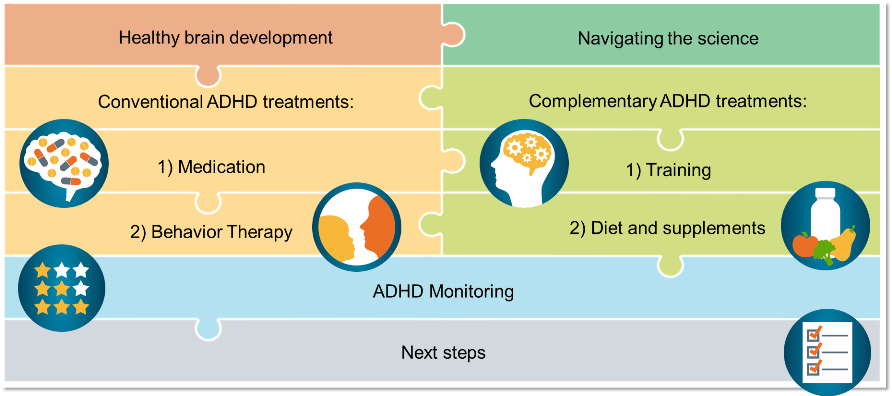5 Must-Read Articles, and an Online Course, to Help Children with ADHD
 —–
—–

– Dr. David Rabiner, Research Professor in the Department of Psychology and Neuroscience at Duke University and founder of the Attention Research Update.
Given the ongoing changes and controversies surrounding ADHD diagnosis and treatment, let us highlight 5 key articles written by Duke University’s Dr. David Rabiner to summarize recent scientific findings and their implications, plus a very relevant online course to help parents and professionals help children with ADHD.
1. Study finds large gaps between research and practice in ADHD diagnosis and treatment
- Key insight: Evidence-based guidelines from the American Academy of Pediatrics on the evaluation and treatment of ADHD are frequently not followed. Many children are diagnosed with ADHD in the absence of clearly meeting DSM diagnostic criteria, and behavioral treatment is rarely recommended.
- Key data point: Pediatricians prescribed ADHD medication to roughly 93% of youth diagnosed with ADHD. Documentation that behavioral treatment was recommended, however, was present in only 13% of the charts.
- Key insight: Clinically-elevated attention problems as perceived by teachers are less stable than imagined, highlighting the importance of carefully reevaluating children each year so that children do not continue to carry a diagnosis that may no longer apply and to be treated for problems at school that are no longer evident.
- Key data point: Data from 3 diverse samples indicates that more than 50% of elementary school children rated by their teacher as having clinically significant inattentive symptoms one year do not show similar problems the following year.
- Key insight: Although the link between ADHD and sleep difficulties is well-documented, evaluating sleep difficulties during an ADHD assessment may be routinely overlooked. In some cases, sleep problems may create significant difficulties for their daily functioning beyond what ADHD symptoms explain, so treating the child’s sleep difficulties should be an important treatment target.
- Key data point: The most prevalent sleep problem – reported for 42% of the sample – was excessive daytime sleepiness, and it contributed to significantly lower life skills even after controlling for ADHD symptoms. The second most prevalent sleep problem was insomnia (for 30% of the sample), and it predicted greater social impairment–above and beyond impairment explained by ADHD symptoms.
4. Reducing the Need for High Medication Doses with Behavior Therapy
- Key insight: The really interesting findings from this study concern the combination of medication and behavioral treatment. On virtually all ADHD measures, adding high intensity behavior management to the lowest medication dose of medication yielded comparable improvements to those produced by the high dose medication alone. For a number of measures, even low intensity behavior management combined with the lowest medication dose was as effective as high dose medication.
- Key data point: Results suggested that a typical child with ADHD could be treated with the equivalent of 5 mg of methylphenidate 2X/day if he/she concurrently received moderate to high intensity behavior therapy. Without behavior therapy, the same child would require a 20 mg dose 2X/day to attain comparable benefits. Thus, the daily reduction in methylphenidate would be 30 mg/day.
5. Mindfulness training for children with ADHD and their parents
- Key insight: Mindfulness training for children and parents can be a helpful intervention for ADHD. Parents can observe reductions in their child’s ADHD symptoms following training. In addition, they can observe declines in their own ADHD symptoms and parenting stress.
- Key data point: From pre- to post test, children who received mindfulness training were rated by their parents as showing significant declines in inattentive and hyperactive impulsive symptoms; the magnitude of the decline was large for attention problems and moderate for hyperactivity. These declines remained evident and of similar magnitude at the 8‑week follow-up.
We hope you enjoy those 5 must-read articles summarizing recent scientific findings and their implications.
To learn more, parents and allied professionals may also want to access the 6‑hour, self-paced, online course How to Navigate Conventional and Complementary ADHD Treatments for Healthy Brain Development, featuring Dr. David Rabiner and SharpBrains’ Alvaro Fernandez.
Learn More & Register Here
(10%-off discount code: sharp2017)
Course description: In order to successfully promote children’s healthy brain development, every parent whose child has been diagnosed with ADHD should learn how to systematically navigate and monitor the range of potential ADHD treatments based on the latest scientific evidence. This course aims at providing the necessary information, frameworks and toolkits to make well-informed decisions, in conjunction with professional advice, about medication, behavioral therapy, exercise, neurofeedback, working memory training, meditation, diet and supplements.




I like the idea of having kids reevaluated every year for ADHD. That way you can see if there is any progress or if it is getting worse. It can also help teachers understand better ways of how to teach those kids.